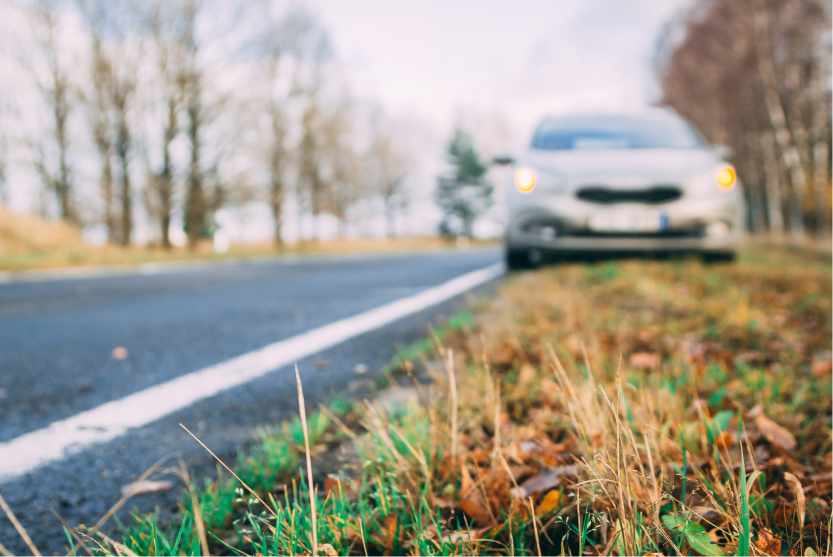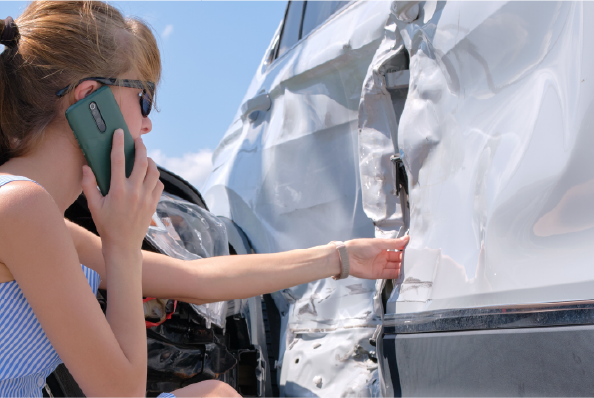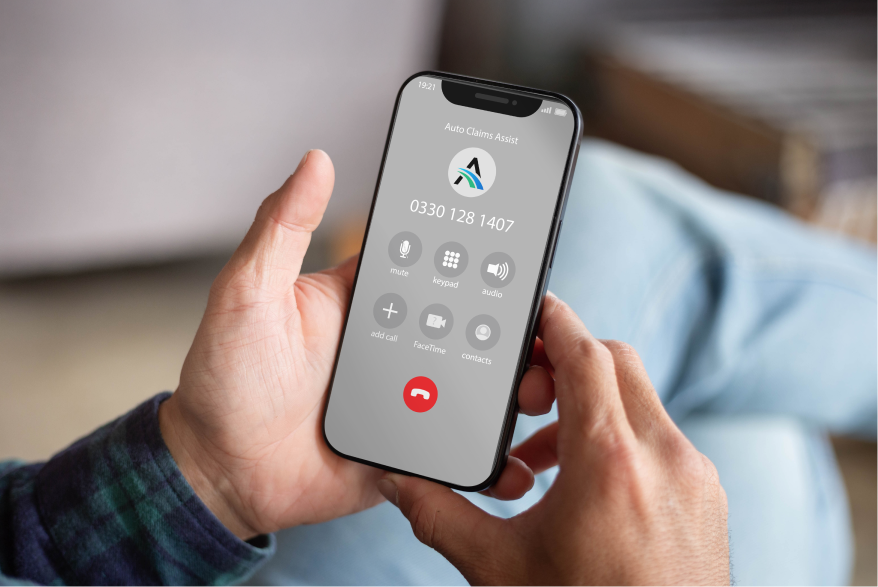How to prove a car accident wasn’t your fault
Your step-by-step guide
What to do after a car accident
[1] Road Traffic Act 1988, Legislation.gov.uk
Read moreOn this page
1
Stop safely and stay calm
[2] Collisions and incidents, Metropolitan Police UK
Read more
First, stop the vehicle safely. Next, switch off the car’s engine and turn on your hazard lights to signal to other drivers about the incident.
It’s natural to feel overwhelmed after an accident. If you’re unsure about the next steps, you’re not alone - many people find themselves in the same situation. High emotions can affect:
- All drivers involved
- Passengers
- Witnesses
- Bystanders
- Even onlookers in other vehicles
Taking a moment to breathe and staying focused on clear communication can make a big difference. Document key details at the scene and encourage a calm environment - this helps prevent unnecessary stress and ensures that everything is handled efficiently.
First and foremost, check yourself, passengers, and anyone else involved for any possible injuries.
If you notice any injuries, no matter how minor they seem, your top priority should be to dial emergency services and request an ambulance. Clearly mention that you’ve been in a car accident and provide them with your location details as accurately as you can.
If it seems like there aren’t any injuries at the scene, it’s a good idea to make a note of that fact. This detail can be vital during the claims process, particularly if there are disputes or claims related to injuries later on.
If you’re in doubt about any potential injuries, err on the side of caution and call emergency services regardless. It’s always better to be safe.
Use the 'what3words' app or website if you're struggling to pinpoint your location. Emergency responders widely use this system, which divides the world into 3m x 3m squares, each assigned a unique three-word address. Sharing these three words allows you to provide precise location details to the emergency team quickly and accurately.


Sometimes, people say sorry out of habit or shock, even if it wasn’t their fault. Read the next section to check what you need to be aware of.
2
Don’t apologise or admit fault
It’s natural to want to say “sorry” after an accident, even if you’re not sure what exactly happened. But it’s wise to hold off on apologising.
Sometimes, people say sorry just out of habit or shock, even if the accident wasn’t their fault. But be careful: others might take your apology as you saying it was your fault, and that can cause issues when it’s time to sort things out with insurance.
If the other driver says they’re sorry or mentions anything about the accident, it’s a good idea to remember what they said and when. This can be helpful later on.
It’s also smart to have someone around who saw what happened, like a witness. They don’t need to know all the rules about accidents, but their memory of the event can help clear things up if needed.
If you’re worried someone might be hurt, always call for help. At the end of the day, everyone’s safety is the most important thing.



If the accident wasn’t your fault, you are eligible to start a non-fault claim.
3
Knowing when to contact the police
It’s recommended that no matter the circumstance, the police are made aware of a car accident collision.
[2] Collisions and incidents, Metropolitan Police UK
Read more
Situations where you should call the police
In certain situations following a non-fault accident, calling 999 is the best option. These include:
- To provide safety, medical care or to protect the scene
- To assist with investigating the collision
- If you suspect the collision was intentional
- If the other driver is uninsured
- If the other driver is under the influence of any kind
- If the other driver fled the scene after the collision
Different ways to report a car accident
If the collision doesn’t require you to call 999, the best course of action is to notify your local police station within 24 hours. You can do this by:


After contacting the emergency services, You should exchange details and record evidence at the accident scene. Read more on what you should do in the next section.
4
Exchanging details at the accident scene
[3] If you’re in an accident, vehicle insurance, gov.uk
Read moreExchanging drivers details
- Driver’s full name
- Driver’s home address
- Driver’s telephone number(s)
- Driver’s insurance details
-
Vehicle registration number
Vehicle registration number
This is the unique reference for the vehicle involved in the accident. You can verify the details to confirm that the licence plate matches the correct registered vehicle through DVLA.
DVLA Vehicle Enquiry Service> - Vehicle’s registered owners details (if the driver is not the vehicle owner)
Collect as much information as possible and report the accident to the police immediately. The Motor Insurers' Bureau (MIB) may be able to cover injury and damage caused by uninsured drivers, provided specific conditions are met.
After the initial shock has passed and you’ve made sure everyone is okay, UK law requires both drivers to share their details. You’ll need to exchange the following:
- Full name
- Home Address
- Telephone Number(s)
- Vehicle Registration Number
- Details of the vehicle’s registered owner (if different from the driver)
It’s also wise to jot down the other driver’s insurance company name. This can be handy if you have trouble getting in touch with the driver later on.
Remember to both collect the other driver’s details and provide your own. It’s an offence not to share your details after a car accident. Failing to do so could not only land you in hot water but might also affect any accident claim you make later.
For a smooth claims process later on, keep the details you’ve collected safe. If you can, save them electronically by sending yourself an email or saving them in cloud storage.
While it’s always good to have a paper and pen for things like sketches (see our section on what information to jot down), remember paper can get lost or damaged easily. So, it’s best to keep a backup.
→ What details to exchange in car accident
Having independent witnesses can be crucial in proving what really happened in an accident.
A strong witness statement can help support your claim, especially when there are disputes over fault.
If there were any bystanders who saw the accident, be sure to collect their full details, including their name, contact information, and a brief account of what they saw.
Ask the witness if they would be willing to assist further if needed by providing a statement or speaking a company like ourselves.



If the accident wasn’t your fault, you are eligible to start a non-fault claim.
5
Information and evidence to collect at the accident scene
Gathering evidence at the accident scene helps prove you were not at fault and increases your chances of a successful claim.
Information to collect:
Take note of all third-party vehicles involved, including make, model, colour, year, and registration plate.
It's very important to take note of the exact time and date of the accident. Also, any precise timing of events leading up to the accident.
If anyone is injured, make sure to make a note of this. In addition, if people weren't injured, make a note of this also.
Take photographs, and if possible videos, of all vehicles, including your own. Make sure to capture damage and positions of vehicles.
In addition to the vehicles, take photographs and videos of the accident scene and surrounding areas.
Make an attempt to fully capture the driving conditions, including lighting, surface quality, weather, etc.
If possible, create a visual drawing of how the accident happened. Agree with this with the other driver and ask them to sign.
Ask witnesses to provide you with a detailed report and note this down. Ask them to sign and date it and collect their details.
If your vehicle has a dashcam, make sure to save and back up the footage as soon as possible. This can provide crucial evidence of how the accident happened.
Additionally, check if any other vehicles involved or nearby had dashcams recording at the time. If possible, ask the drivers if they are willing to share the footage.
Look around for any nearby buildings, businesses, or public areas with CCTV cameras that might have captured the accident.
If you find one, ask the property owner or relevant authority if they can provide access to the footage. CCTV evidence can be valuable in verifying details of the accident.
Try to record all the information at scene and decide to process a claim afterwards. It’s also smart to have someone around who saw what happened, like a witness. They don’t need to know all the rules about accidents, but their memory of the event can help clear things up if needed.
[**]
Strong evidence that increases the chances of a successful non-fault claim. Learn more about proving a car accident wasn’t your fault.
Trustpilot
Auto Claims Assist collected all the required evidence, including reaching out to my witness, dealt with all the to and fro between the bus company and worked with me to prevent my vehicle from being economically written off. They also made sure I was provided with a courtesy car within 24 hours of the incident.
6
Getting accident recovery at the roadside
After a car accident, extensive visible damage often clearly indicates the need for recovery. However, at times, damage isn’t as apparent.
Operating an unroadworthy vehicle is not only unsafe but also illegal in the UK. If you aren’t sure whether the car is safe, you should avoid driving it to prevent any further risk or complications. When considering accident recovery, the important things to know are:
Recovery options for non-fault drivers
Avoid contacting your own insurance for recovery. Equally, avoid paying out for a private recovery service. There is a better way, at no cost to you, by working with an accident management company.
→ Discover non-fault accident recovery
Vehicle checklist for damage
Checking that your vehicle passes a ‘roadworthy vehicle check’ is the first place to start when considering recovery.
Tyres and Wheels
- All tyres inflated (no visible punctures or bulges).
- Tread depth meets the legal minimum of 1.6mm across the middle three-quarters of the breadth of the tyre and around the entire circumference.
- No significant damage to the wheels.
Brakes
- Brakes are responsive and don’t feel spongy.
- No unusual noises or grinding when brakes are applied.
- Handbrake engages and holds the car.
Lights
- Headlights (both main and dipped) are operational.
- Brake lights illuminate when brakes are applied.
- Indicators flash and are visible.
- Tail lights and number plate lights work.
Fluid Leaks
- No noticeable fluid patches or drips under the vehicle.
- Brake fluid, coolant, and engine oil levels are within recommended levels.
Windows and Mirrors
- Windscreen and windows are clear with no significant cracks.
- Wing mirrors and rear-view mirror are correctly positioned and undamaged.
Exhaust
- No excessive smoke or unusual sounds.
- Exhaust is securely attached.
Warning Lights
- No warning lights remain illuminated on the dashboard after starting the vehicle (e.g., engine warning, ABS, airbags).
Steering
- Steering wheel turns smoothly without resistance.
- No unusual noises when turning the wheel.
Vehicle Structure
- No parts dragging or hanging off the vehicle.
- Doors close securely and lock properly.
Battery
- Vehicle starts without hesitation.
- No warning lights indicating battery issues.
Trustpilot
Just a single phone call from the scene of the accident, recovery was organised immediately. A hire car was provided within three days for three weeks. All at no charge. They did exactly what they said they were going to do.
7
Report accident and start claim
Many instinctively call their insurance after an accident, either to claim or seek advice, as most insurers have dedicated lines for this.
However, if you’re not at fault, directly claiming through your insurer may leave you at a disadvantage. Accident management companies offer an invaluable alternative, handling claims independently to ensure non-fault drivers receive what they’re entitled to with minimal disruption.
If you’re not at fault, going directly to your insurer isn’t the most beneficial option, here's why:
- Your premiums could increase.
- You’ll need to pay your policy excess.
- It might affect your no-claims discount.
- They may use non-genuine parts for repairs.
- They aim to save money, which may not always favour you.
- You might get a basic courtesy car for only a short time.
- They might not value your car accurately if it’s a total loss.
- They could end up directing you to an accident management company anyway and get paid for it!
If you're a non-fault driver, an accident management company can ensure you receive everything you're entitled to - at no cost to you. We handle the entire claims process, providing a hassle-free experience. Check if you are eligible for a non-fault claim online or call us on 0330 128 1407.
Benefits of claiming with Auto Claims Assist:
- We’re rated EXCELLENT on Trustpilot.
- You’ll have a dedicated, personal claims handler.
- Your no-claims bonus stays unaffected.
- We’ll give you a comparable vehicle replacement for the full duration your vehicle is off the road
- We offer 24/7 nationwide recovery and secure storage.
- Our BSI Kitemark accredited engineers use only new manufacturer-approved parts and paint.
- No out-of-pocket expenses for you.
- No excess to pay to claim
Start a non-fault claim
With Auto Claims Assist
- Independent to insurers
- Your insurance policy protected
- Prioritising your rights


Trustpilot
I wasn't at fault, the guy who hit me, his insurance company instantly tried to provide me with an offer that wasn't even close to the value of my vehicle. Without my case handlers I wouldn't have me vehicle back, fully repaired i can't thank her enough for the time and dedication put into fighting my case.
Reference in this article
[1] Road Traffic Act 1988, Legislation.gov.uk
Do I have to pay excess if the accident wasn't my fault
Do I lose my no claims if the accident wasn't my fault
Will A Non Fault Accident Affect My Insurance
Accident Management VS Your Insurance Company